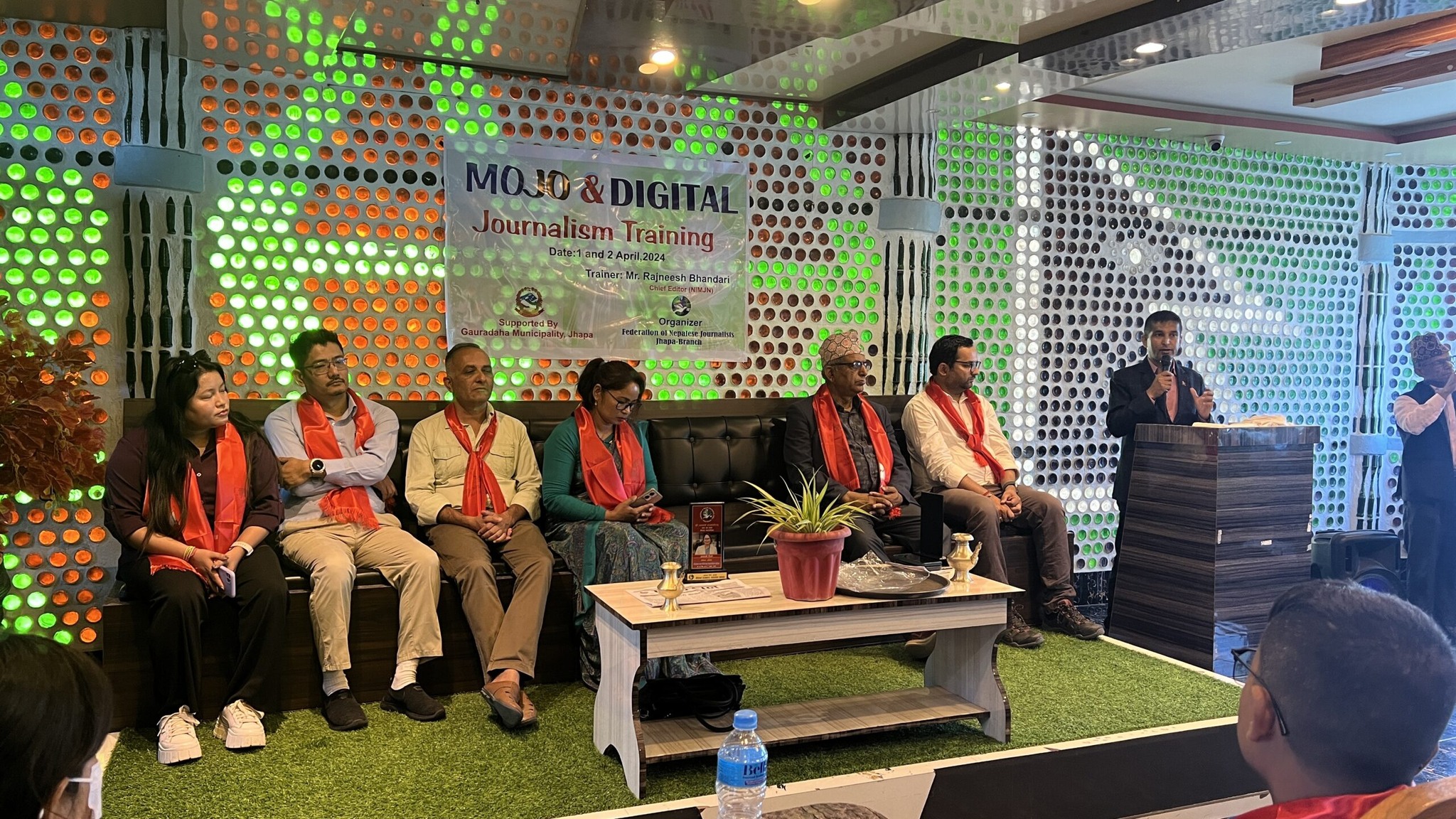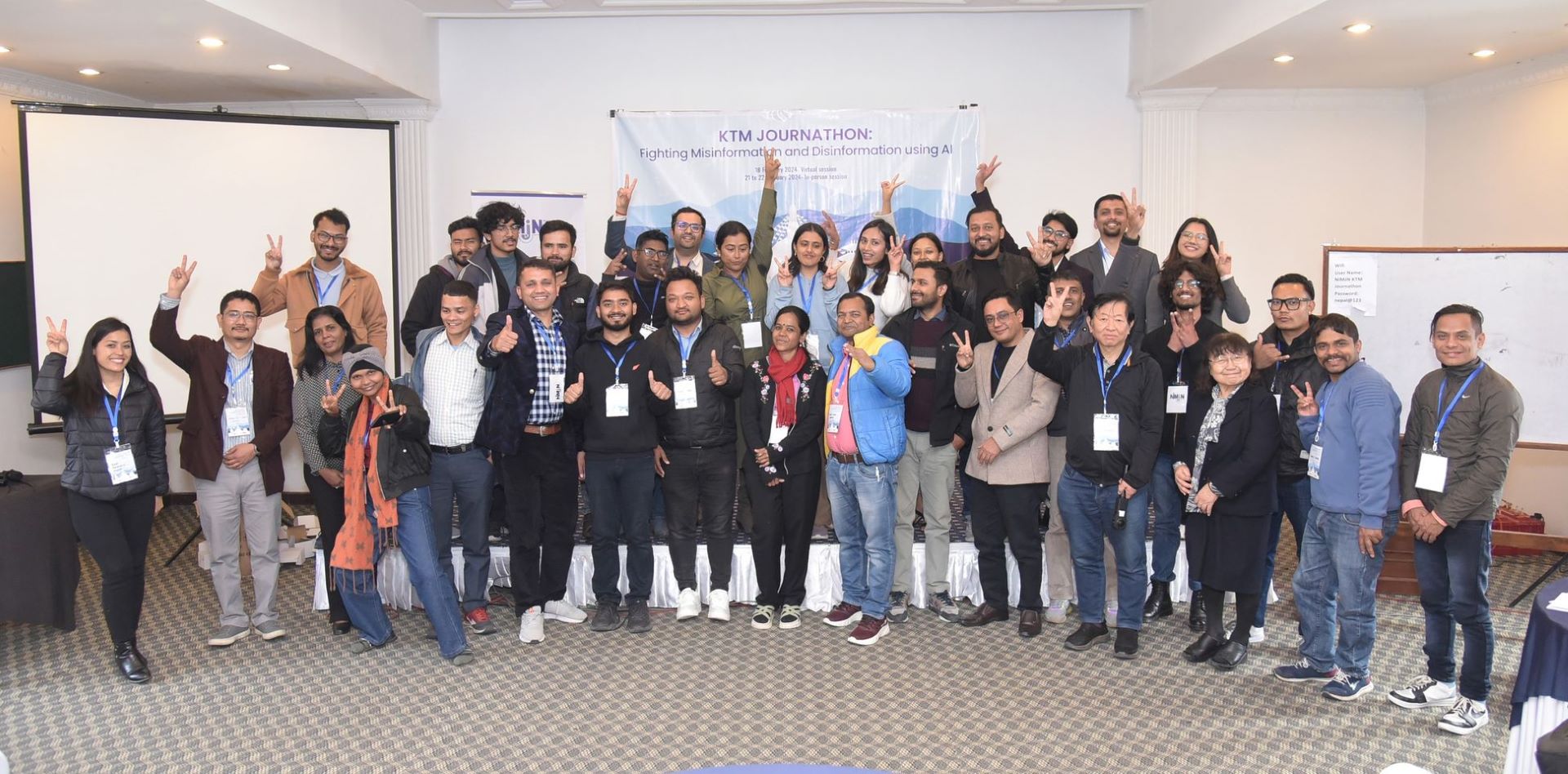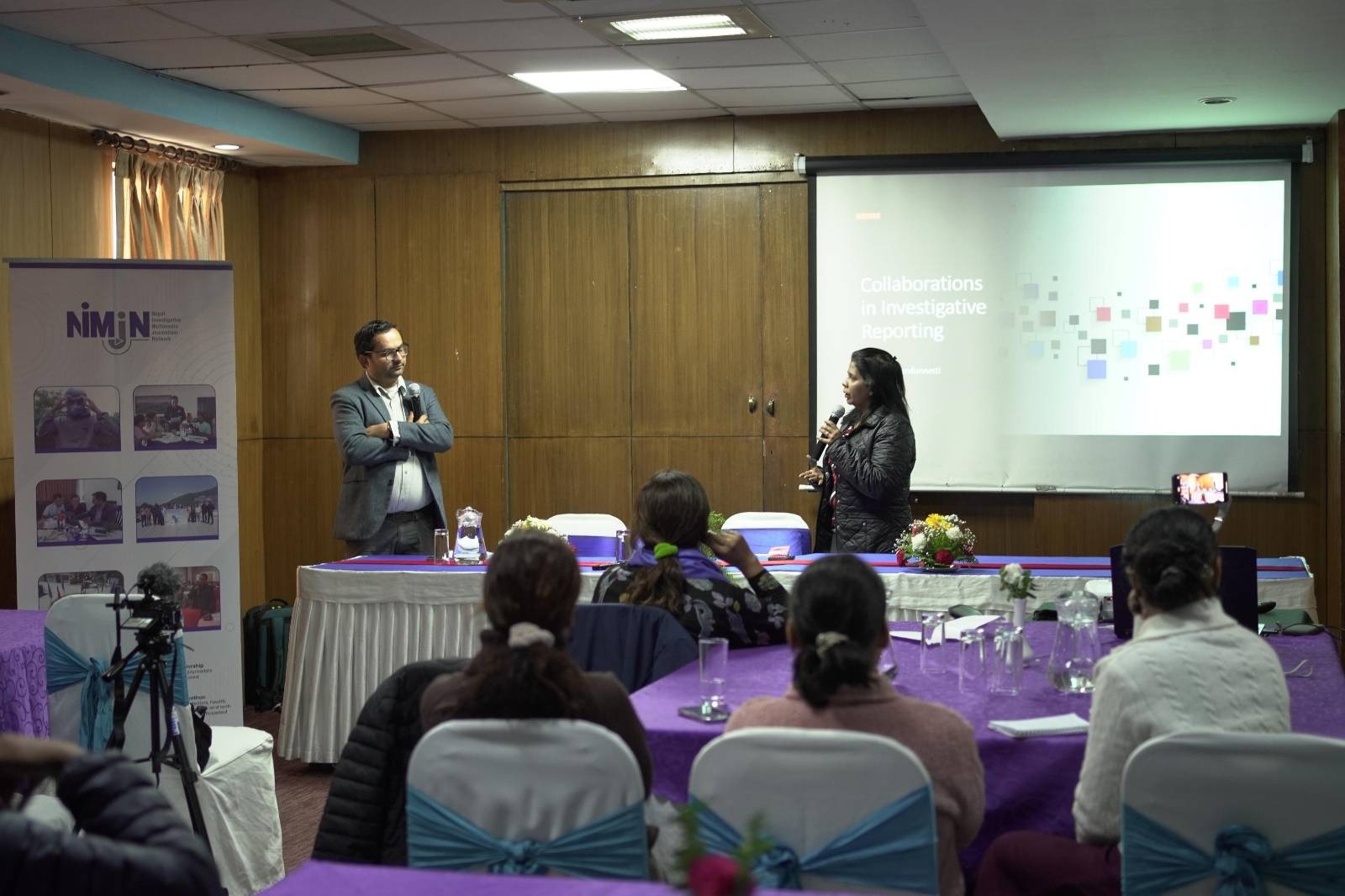Nepal Investigative Multimedia Journalism Network (NIMJN) organized the second three days "Safety and Fact-checking Training for Nepali Investigative Journalists" from September 21 to 23, 2020.
In the three days long virtual training, national and international journalists and experts trained journalists on safety, stress management, fact-checking, online multimedia tools, collaborative, investigative, and accountability reporting.
A total of 25 participants (9 female and 16 male) affiliated with various media outlets from 18 districts participated in the training. Journalists participated from Bajhang, Banke, Bhaktapur, Dang, Doti, Ilam, Jhapa, Kavrepalanchok, Kathmandu, Lalitpur, Mohattari, Nuwakot, Palpa, Panchthar, Pyuthan, Rupandehi, Sindhuli, Surkhet districts using zoom, a virtual video conferencing platform.
Dr. Navindra Raj Bista, M.D., assistant professor of Tribhuvan University, spoke on the safety of journalists during COVID-19, and senior journalist/ writer Hari Bahadur Thapa discussed on the investigative reporting issues while reporting COVID-19. Amantha Perera, Asia-Pacific Coordinator for the DART Center for Journalism and Trauma talked about self-care for journalists. Prof. Dr. Umesh Arya, a senior trainer from the Google News Initiative India Training Network, discussed various approaches and methods of Fact-checking using the easily available tools. Vikrant Pandey, founder, Fight Back Nepal, discussed the importance of situational awareness while doing investigative stories during the pandemic. Dwarika Nath Dhungel, Ph.d., Former Secretary, Government of Nepal spoke on National Agenda and Accountability Reporting.
In this training, NIMJN’s chief editor Rajneesh Bhandari trained participants on the available online multimedia tools that journalists could use while reporting the pandemic and on the importance of collaborative reporting. As a part of the training, a mini anapana meditation- an introductory session to Vipassana will also be organized for journalists.
"We want to make it beneficial and useful for investigative journalists who are working during this COVID-19 pandemic in Nepal," Bhandari said at the closing of the training.
NIMJN’s Safety and Fact-checking program is supported by Humanity United.
Feedback from participants:
"My friend suggested me to apply for this training, but I was not sure if I would be selected because it was only for 20 journalists. The "Safety for Journalists during COVID-19" session provided lots of information about COVID-19 and the safety measures, and I have started to inform my friends and neighbors about the safety protocols. "Fact-checking: approaches and methods" session will support us in our daily reporting. I found the situational awareness session so much important for investigative journalists. The requested extra session of video editing was helpful. Further, we need advanced training in multimedia journalism. " – Sabitri Basnet, Nagarikpost.com, Kathmandu
"Frankly speaking, this was the first long virtual training that I attended. I found this training as a complete package. It included health and safety, stress management, collaborative investigative reporting, Vipassana, and accountability analysis of the government. I learned many new things and enjoyed the overall training. I am also interested in a ten days Vipassana course because it will support journalists to manage stress." – Rakesh Prasad Chaudhary, Jaleshwor Today, Mohattari
"The entire training was fruitful and I participated full time. The stress management and collaborative investigative reporting sessions were more interesting for me. The national and international speakers were excellent.” – Bikram Khadka, Buddha Community Television, Rupandehi
“This training exceeded my expectation. My working district Jhapa is near the India border, it was difficult to maintain the social distance while reporting COVID-19, and this training taught the tools and techniques of safety and maintaining social distance. The fact-checking session was so useful. Online multimedia tools and techniques of collaborative reporting were new to me. I would like to attend mobile journalism training in the future." – Chiranjivi Ghimire B.K., Naya Patrika Daily, Jhapa
Participants of the training:
|
S.N. |
Last Name |
First Name |
Gender |
Address |
Media Outlet |
|
1 |
Adhikari |
Ranjita |
Female |
Ghorahi, Dang |
Naya Yugbodh |
|
2 |
Basnet |
Sabitri |
Female |
Kathmandu |
Nagarikpost.com |
|
3 |
Bhandari |
Laxmi |
Female |
Surkhet |
National News Agency |
|
4 |
Budhathoki |
Radhika |
Female |
Sindhuli |
Radio Siddhababa/ Himalayan Times |
|
5 |
B.K |
Prem Bahadur |
Male |
Banke |
Radio Morning Star |
|
6 |
Chaudhary |
Rakesh Prasad |
Male |
Mohattari, Jaleshwor |
Jaleshwor Today |
|
7 |
Devkota |
Sanjita |
Female |
Lalitpur |
Ujjwalo Online |
|
8 |
Dhakal |
Tanka |
Male |
Lalitpur |
Deshsanchar.com |
|
9 |
Ghimire |
Keshab |
Male |
Kathmandu |
Nepallive.com |
|
10 |
Ghimire B.K |
Chiranjivi |
Male |
Jhapa |
Naya Patrika Daily |
|
11 |
Guragain |
Madhusudhan |
Male |
Panauti, Kavere |
Nagarik Daily |
|
12 |
Khadka |
Bikram |
Male |
Rupandehi |
Budha Community Television |
|
13 |
Lamsal |
Himal |
Male |
Palpa |
Nagarik Daily |
|
14 |
Neupane |
Santosh |
Male |
Kathmandu |
Nepalkhabar.com |
|
15 |
Pahadi |
Prajwol |
Male |
Pyuthan |
Karobar National |
|
16 |
Pangeni |
Rudra |
Male |
Kathmandu |
Centre for Investigative Journalism Nepal |
|
17 |
Pulami Magar |
Krinjala |
Female |
Sindhuli |
Karobar Daily |
|
18 |
Rai |
Bidhya |
Female |
Kathmandu |
Kantipur Daily |
|
19 |
Regmi |
Sarala |
Female |
Panchthar |
Radio BSC |
|
20 |
Shrestha |
Sunil |
Male |
Nuwakot |
Dabalikhabar.com |
|
21 |
Shrestha |
Sushil |
Male |
Pyuthan |
Gorkha Daily |
|
22 |
Sinal |
Dhirendra |
Male |
Kathmandu |
Freelancer |
|
23 |
Singh |
Basanta Pratap |
Male |
Bajhang |
Kantipur Publication |
|
24 |
Singh |
Dil Bahadur |
Male |
Doti |
Gorkhapatra Daily |
|
25 |
Sunuwar |
Sujata |
Female |
Ilam |
Ujyaaloonline |
Also read:
Safety and Fact-Checking Training for Investigative Journalists Held



